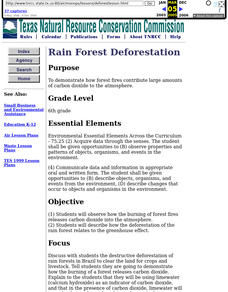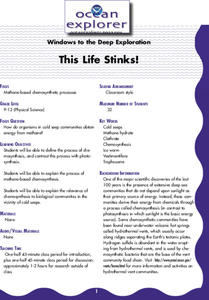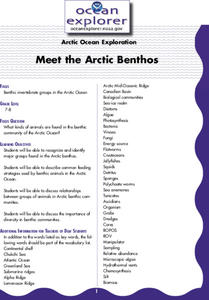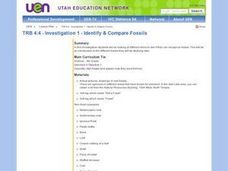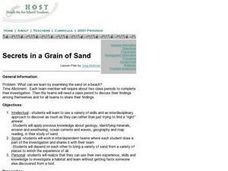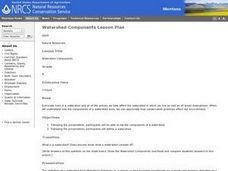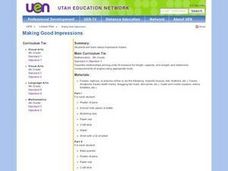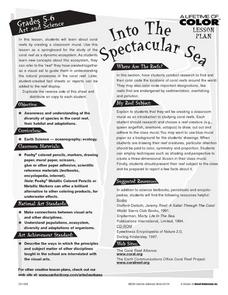Curated OER
Rain Forest Deforestation
Sixth graders explore the destructive deforestation of rain forests in Brazil to clear the land for crops and livestock. Students demonstrate how the burning of a forest releases carbon dioxide by performing an experiment.
Curated OER
Winds Over Land vs. Ocean
Students explore friction and the way it impacts wind over the ocean compared to over land.
Curated OER
This Life Stinks!
Young scholars explore the process of chemosynthesis and contrast this process with photosynthesis. They consider the relevance of chemosynthesis to biological communities in the vicinity of cold seeps.
Curated OER
Meet the Arctic Benthos
Learners recognize and identify major groups found in the Arctic benthos. They describe common feeding strategies used by benthic animals in the Arctic Ocean. They discuss relationships between
Curated OER
One Tough Worm
Pupils explain the process of chemosynthesis. They are able to explain the relevance of chemosynthesis to biological communities in the vicinity of cold seeps.
Curated OER
Cleansing, Sparkling Koos
Students explore the importance of water conservation and investigate how plants clean water.
Curated OER
River and Us (A)
Students define and demonstrate proper use of common good, preserve (as in clean water) and public good as applicable to clean water.
Curated OER
UMNH: Cultural Clutter - Tales In The Trash
Fourth graders list three or more types of evidence of prehistoric cultures that encouraged archaeologists to investigate the marshes around the Great Salt Lake. They also explain why it is important not to disturb archaeological remains.
Curated OER
Investigation 1 - Identify & Compare Fossils
Fourth graders examine different items to see if they can recognize fossils. This be an introduction to the different fossils they be studying later and help them make inferences about past environments of Utah.
Curated OER
Interpreting Satellite Images
Students identify differences between photography and satellite imagery space.
Curated OER
LESSON PLANS (print version) pdf What is a Fossil?
Students can better explain how mould and cast fossils occur when they make their own cast fossils using plaster of Paris and objects such as shells, bone or even their own hand or footprint.
Curated OER
Why Do We Need Petroleum?
Students learn the many ways petroleum is used in our industrial society, and the advantages and disadvantages of its use. They explore what it would be like to live in a world without petroleum.
Curated OER
The Politics of Water
Students investigate the Governor's Kansas Water Initiative. Students study rivers, cities and reservoirs and how their location effects the importance of their water quality issues.
Curated OER
Cool, Clear Water - Or Is It?
Students use a problem solving method to offer a solution to one of the water quality problems within the Kansas Lower Republican River Basin. Groups research a problem area, then produce a skit, poem, song or story to illustrate the...
Curated OER
Bermuda Today: Who Were Its Geologic Ancestors?
Students explore how the island of Bermuda came to be.
Curated OER
Teaching about Rain Storms, Land Use, and Lake Turbidity
High schoolers investigate the impacts of major rainfall and subsequent runoff on turbidity in lakes. They, in groups, develop a presentation of their research and/or write a paper summarizing their investigation.
Curated OER
Urban Impact on Chollas Creek (California): A Field Study
Students, in groups, take samples from a creek and keep a field journal on their samples. They also perform tests on their samples.
Curated OER
Secrets in a Grain of Sand
Students working in small groups examine beach sand to discover signs of erosion, weathering, ocean currents and waves. They present their findings to the class.
Curated OER
Watershed Components
Eighth graders examine the components of a watershed. They view overheads, discuss the hydrologic cycle, and observe a demonstration of a soil erosion box.
Curated OER
Dino Detectives
As students examine maps of Utah, 4th graders search for clues about what prehistoric life was like in Utah.
Curated OER
Making Good Impressions
Fourth graders participate in an experiment where they experiment with impression fossils. They identify and describe the measurable attributes of the impression fossils. There are many parts and materials for this experiment.
Curated OER
See It Settle
Students layer different types of soil in water. They are to keep a watch on how the soils react with one another in water.
Curated OER
Into the Spectacular Sea
Students research coral reefs as dynamic ecosystems and the part that each organism plays within that ecosystem. They create a mural of a coral reef.
Curated OER
Superbugs
Students research deep sea communities and discover strategies for combating antimicrobial resistance and write reports on it. They consider overprescription and prophylactic uses of antibiotics as causes for their ineffectiveness.
Other popular searches
- Sedimentary Rocks
- Deposition of Sediment
- Sedimentary
- Sedimentary Rock Layers
- Edible Sedimentary Rocks
- Define Sedimentary Rocks
- Sedimentary Rocks Fossils
- Sedimentary Rock Formation
- All About Sedimentary Rocks
- Types of Sedimentary Rocks
- Sedimentary Rock Experiment
- Sedimentary Rocks Minerals


